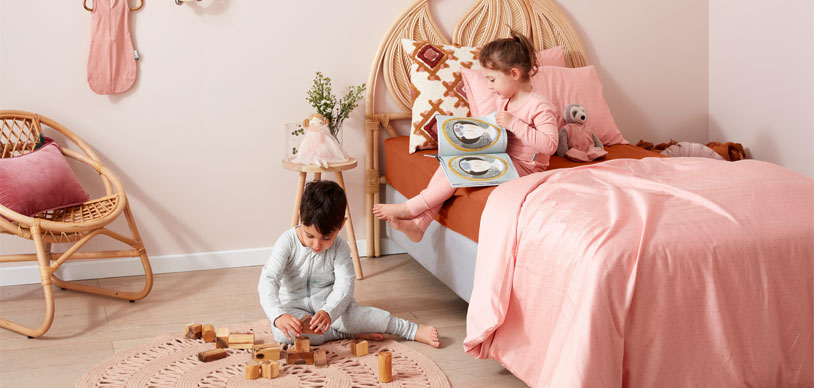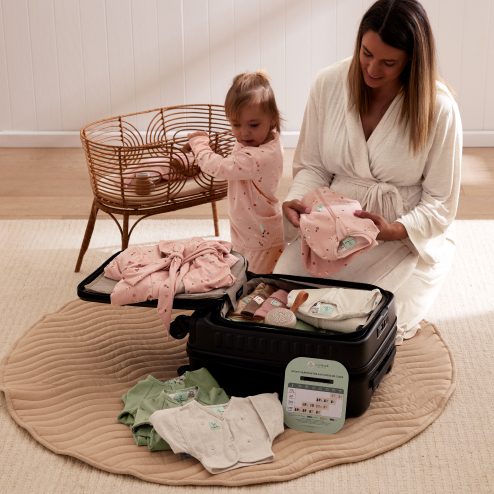10 ways to encourage independence in your toddler and preschooler
29 November 2021 Toddler Sleep Preschooler SleepThe following article has been written for ergoPouch by registered pediatric psychologist, Amanda Abel (BsocSc, BAppSc(Psych)(Hons), MAPS, MAAPi). Amanda practices in Melbourne, Victoria at the Centre for Child Development.

The toddler and preschool developmental periods are a time of huge change for children. The brain undergoes significant growth, and these little people are continuously learning about the world and their place in it. Children of this age group will naturally start gaining independence, which is important to encourage as it allows them to develop a sense of security and confidence. If you’re searching for ways to raise an independent child, try some of these tips…
1. PUT THEM TO WORK!
Getting your child involved in household chores is great method of teaching kids independence. You can have them help push the buttons on the washing machine, put the garbage in the kitchen bin for you, or help with carrying light groceries in from the car.
2. INCREASE THEIR CONFIDENCE THROUGH THEIR STRENGTHS
If your child is particularly good at something, for example doing puzzles, reading to themselves or creative play, encourage them to do more of it. The more time we spend doing things we’re good at, the more confident we feel about ourselves – and confidence is what we need for independence!

3. SIMPLE SELF-HELP ACTIVITIES
Having your child turn off the bath tap, close the front door, brush their teeth, dress themselves, or persist with opening their snack box will let you observe where their skills are at while they experience a sense of achievement and develop their toddler independent stage.
4. USE ENCOURAGING LANGUAGE
While teaching kids independnece, in daily activities, praise your child for their efforts and for giving things a try rather than praising a positive outcome. This allows them to value the process, and they’ll experience positive praise in situations that won’t always result in a successful outcome which encourages grit. Try using phrases like “I love how you kept trying with your puzzle” or “It was hard to try the new cereal wasn’t it? I’m so proud of you for giving it a try”.
5. GIVE THE GIFT OF TIME
When providing opportunities for your child to be independent, make sure you give them enough time to attempt and complete the task. Remember that it will take them longer to do new tasks and that’s okay!

6. USE 'CHAINING' FOR TRICKY TASKS
Chaining is where we break down a task into steps and then have the child perform either the first or last step initially, while we perform the rest. Slowly the child will perform more and more steps in the chain until they’re doing it all. It’s a great strategy for raising an independent child.
If they’re starting at the first step, you can then add the second step and so on; or if they’re completing the final step initially, you’ll then get them to complete the final two steps, then the final three etc. Think of tying shoelaces – you can have your child do the first step - tying the knot, and then you perform all the steps that follow. Or, you could start the process and have your child pull the final loop through and tighten the bow. Having your child work forwards by starting the process, gives them the chance to embark on a big task without the sense of overwhelm because they know you’re there to help, while having them work backwards gives them the opportunity to feel the success of the final step once you’ve completed the earlier steps.
7. THE POWER OF CHOICE
Allow your child to make frequent choices from limited options provided by you. The choice of two is my personal favorite because it gives a nice clear limit that is not overwhelming. Imagine how daunting it can be for a toddler to be given an open ended choice like ‘what do you want to play?’ compared with “should we play with the cars or the puzzles?”. Too much choice without limits is scary for kids, but choice within your limits and boundaries is safe.
8. SELF FEEDING
As a feeding therapist I could give you a hundred reasons why you should let your child feed themselves; however, simply through the lens of independence self-feeding gives your child a sense of control whether that be with finger foods or trying out cutlery. Be at one with the mess, and you won’t regret using self feeding as part of encouraging your toddler’s independence stage!
9. TALKING TO OTHER ADULTS
Encouraging your child from a young age to engage in conversation with the other adults in your life will prepare them for the future interactions they’ll have in the community and with teachers at kinder and school. Prompt your child to answer questions from your friends, or to say ‘thank you’ when they receive their baby cino at the local café.
10. TALK TO YOURSELF!
Being independent means learning how to cope with challenges. Modelling positive self-talk will give your child an effective tool for managing when their attempts at independence don’t go according to plan. So, if you are having trouble reaching something up high, if your child observes you engaging in self-talk like “this is really tricky, but I know if I get the step ladder I’ll be able to reach it” they’ll be more likely to imitate this positive coping strategy themselves.
When it comes to how to raise an independent child, it’s important to have a strategy. When children don’t have enough opportunities to practice independence within the safe boundaries of their caregivers, they can feel inadequate and afraid to be in the world without their caregiver – they become heavily reliant and don’t trust that they have the skills themselves to manage age-appropriate situations. This can lead to a reluctance to separate from parents and a fear of making mistakes. While encouraging independence requires patience and time in the short term, it pays off in the long run with a child who can flourish with a sense of security and confidence in the world.
Amanda Abel
Pediatric Psychologist




